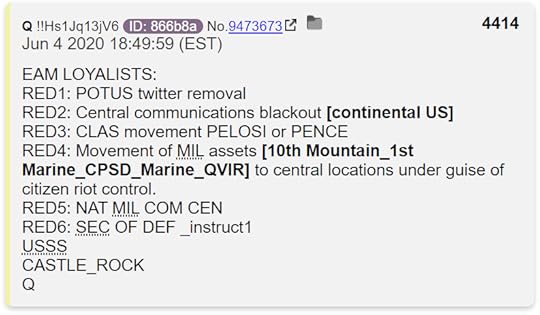Praying Medic's Blog, page 32
February 3, 2021
The Gates of Shiloh – Chapter 4

A small tornado of leaves swirled toward a black wrought iron gate. Bending this way and that, like a drunken man searching for a tavern door, it passed through the metal framework of the gate and deposited the leaves in a mud-choked river. The gate had been fashioned years ago by a skilled craftsman. A dark-haired woman drew near. Timidly brushing aside a handful of spider webs, she peered through an opening in the gate. Frightened little girls ran to and fro being chased by dark spirits. A winged creature circled high above, its body barely visible against the dark, moving sky. It let out a dreadful screech.
The woman took a path to the right and walked along the foul-smelling stream. She approached a large building made of dusky purple, green, and blue stones. When she arrived at it, she went inside and pulled the groaning, weathered door shut behind her.
She stood in the middle of a parlor. A spiral staircase wound its way around the perimeter that had landings at all four of the upper floors. “Ladies, I need to speak to you!” She waited with her hands on her hips. A short, stout woman with red hair walked toward her from the kitchen. A tall woman with blonde hair and brilliant blue eyes came down the stairs. More women followed behind. They came from all directions. Before long, a dozen women of various ages had gathered around her. “Thank you for coming. We need your help. We’re at a mental hospital, and from what we can tell, we’re going to be there for at least three days. Roxanne is up right now, but we’ll need someone to take over who will cooperate with the staff and play nice until we’re released.” She looked at the tall blonde woman. “Jacquelyn, this is your specialty. Would you like to take over for a few days?”
“Why is it always me who has to get us out of trouble?”
The short redhead chimed in. “This is all Roxanne’s fault. If that stupid bitch would cool her jets and keep her fat mouth shut, we wouldn’t be in this—”
“Lucy,” the dark-haired woman interrupted, “I know how you feel, but what’s done is done. We can’t change it.”
“You’re one to talk, Lucy, you hypocrite,” said a tall woman with auburn hair and green eyes. “At least Roxanne isn’t sleeping with every truck driver who springs for a cup of coffee.”
“Screw you, Gina,” Lucy replied.
“I’ve had just about enough of your crap,” Gina replied moving closer.
“Stop it!” the dark-haired woman said, “I’m tired of your bickering. Right now, we need someone to go up who will cooperate with the psych facility staff. Unless you want to stay here indefinitely.”
“Fine. I’ll do it,” Jacquelyn said, walking toward the door. “When Roxanne gets back, would you tell her to do something about the darks? They’re terrorizing the littles again.”
“Thanks, Jacquelyn,” the dark-haired woman said, “I’ll tell Roxanne as soon as she gets back.”
~~~
Emilia continued typing her report. Roxanne stared at the computer screen. Her eyes closed. After a moment, they opened again. Their jade green color had become a brilliant blue.
This is an excerpt from my book, The Gates of Shiloh, which is available through Barnes & Noble or Amazon.

The post The Gates of Shiloh – Chapter 4 appeared first on Praying Medic.
January 30, 2021
The Military, Academia and Social Media – What Happens Next?

The 9th in a series of messages about where America may be headed following the 2020 election.
That American institutions have become corrupt is a fact not in dispute among readers of this site. Some people believe the remedy for corruption is the arrest and prosecution of the guilty. While the prosecution of corrupt people might make us feel better, it doesn’t address the root cause. Evil people prosper in corrupt societies because the institutions they inhabit enable their malign activities. You can remove troublemakers, but if you don’t remove the corrupting influences endemic to the institutions in which they operate, more evil people will take their place, and corrupt practices will continue. If one hopes to remove widespread corruption, they must reform the agencies and institutions of society where corruption exists.
Over the last three decades, China has managed to infiltrate, and through ideological subversion and exfiltration of valuable information, gain influence over many American institutions. Scandals involving Dianne Feinstein and Eric Swalwell, both of whom cooperated with Chinese spies, are a couple of recent examples.
American institutions of higher learning have likewise become corrupted by foreign influence. In the last year alone, several American professors have been arrested for secretly cooperating with China’s plan to subvert our education system. The arrest of a few professors doesn’t solve the problem. College professors are manipulated by the Chinese government for a reason. There exists in the halls of academia a pervasive belief that America is evil. This belief legitimizes—at least in the minds of academics—the subversion of our nation. This brings me to the dream I had two nights ago.
In the dream, the U.S. military took a new stance toward American institutions of higher learning. Colleges perceived this new relationship but they were uncertain about the military’s intentions. They were worried that the military may try to exert a new kind of influence over them.
If, as I’ve proposed in other articles, the military intends to bring reform to America, they would need to address the problem of foreign influence in institutions of higher learning. I believe that is the issue to which this dream speaks.
Tonight, I had a dream in which the military suddenly began posting a new kind of message on social media. Unlike their current messaging that supports ongoing missions and values, these posts provoked citizens to think of themselves and society differently. They were reminiscent of the messages posted by Q, but they appeared directly on social media. It was almost as if the military had gained control of social media companies.
Google, Facebook, and Twitter long ago came under the control of foreign governments. The current effort to control public opinion through online censorship is unprecedented in American history. If the military intends to address the problem of widespread malign influence, it must change the way in which social media companies operate.
I have friends who still believe we live in a constitutional republic; the idea that the military would intervene in governmental affairs and the operation of private companies frightens them. They fear that our constitutional rights might be suspended. These same people have watched fascists burn cities to the ground without fear of prosecution while patriots who peacefully supported their president were arrested as insurrectionists. They’ve watched mayors and governors destroy private businesses for political gain. They realize our elections are rigged. They know the courts, the DOJ, and Congress are corrupt. They understand that Silicon Valley has removed our first amendment right to free speech. And yet, somehow, they don’t see that America has become a banana republic by every metric that matters except standard of living.
Personally, I don’t fear intervention by the military. We surrendered our constitutional rights long ago. Perhaps the military can straighten out this mess. I only pray that if they do intervene, they do it swiftly, they reform corrupt institutions and make an effort to restore the values America once stood for.
The post The Military, Academia and Social Media – What Happens Next? appeared first on Praying Medic.
January 27, 2021
Limited Communications – What Happens Next?

The 8th in a series of messages about where America may be headed following the 2020 election.
On January 18th, I posted a message describing a dream I was given about coming military storms. That dream seemed to foreshadow a future time when the U.S. military will intervene in American life in a significant way.
On the night of January 25th, I had a dream where a survey had been taken. It appeared as if all the votes had been counted, but suddenly, a large number of votes came in and all of them were in favor of military intervention. This dream suggests that the final outcome of the November election has not yet been decided. If the military does intervene, the outcome of the 2020 election could be changed.
This morning, I had a dream showing a future time when restrictions will be placed on the ways in which citizens are able to communicate. The dream showed limitations on the licensing and use of amateur radio, citizen band radio, and similar means of communication. If, as other dreams have indicated, a military intervention is coming, a temporary restriction on communications would be expected.
The post Limited Communications – What Happens Next? appeared first on Praying Medic.
January 23, 2021
The Military Is the Only Way – What Happens Next?

The 7th in a series of messages on where America may be headed following the 2020 election.
On November 1st, 2016, Steve Pieczenik posted his first YouTube message informing the world that Hillary Clinton (with the help of corrupt government employees) had pulled a soft coup in an attempt to become President. Pieczenik went on to say that patriots in the military and intelligence agencies had launched a soft counter-coup that would prevent her from assuming power. Steve was the first person to explain that a battle was underway to control America, and that good people in the military and intelligence community were backing Donald Trump as a presidential candidate.
Pieczenik said the weapon of choice for patriots in 2016 was information. Julian Assange had been given emails exposing Hillary Clinton’s corruption. Their release was timed to sabotage her run for the White House. Her lackey, James Comey, did what damage control he could, but the emails caused enough public embarrassment to allow Trump to win the 2016 election.
In another video, Pieczenik said the military had recruited Donald Trump to run for President. Trump later confirmed that claim. At a ceremony where General Milley replaced General Dunford as Chairman of the Joint Chiefs of Staff, Trump recalled the time in 2015 when Dunford asked him to run for President.
During the last four years, did patriots in the military release information about corruption to wake up the citizenry?
Did the military hope that citizens would use elections to remove corrupt people from power?
How did the DC swamp overcome the record turnout of Trump’s base in November?
Rig the vote for Biden?
In a delicate procedure where the risk of harm is significant, are the least invasive methods tried first?
If the first attempt is unsuccessful, are more invasive methods considered?
Did the military try the least invasive method of removing corruption?
Did the first attempt fail?
Why?
Corrupt politicians still control elections?
Does the military have other (more invasive) methods at their disposal?
Did President Trump do everything humanly possible to expose corruption?
“I left it all on the field.”
What was the response of the DOJ, governors, mayors, state legislators, Congress, and the courts to evidence of corruption?
Turn a blind eye?
Having given them the opportunity to address corruption, can the military step in?
When non-military institutions and agencies refuse to deal with corruption, who enforces the rule of law?
What is the last line of defense against anarchy and tyranny?
Military?
Was President Trump’s term in office good for the military?
Rules of engagement changed?
Troops home from foreign wars?
No new wars?
Military pay raise?
Improved VA healthcare?
Was Trump’s term in office good for the world?
Peace with North Korea?
Peace in the Middle East?
Would the military trust Trump with the fate of the nation?
Why?
Proven track record?
Did Trump hint that he would be back in office?
Why?
If the military planned to intervene in the Biden administration, would Trump know?
Were there protests in Washington D.C. during Biden’s inauguration?
No?
Why did the military build a fenced and guarded perimeter around the capitol?
Does the military plan to keep 7,000 National Guardsmen in DC through mid-March?
Why?
The military is the only way.
The post The Military Is the Only Way – What Happens Next? appeared first on Praying Medic.
January 22, 2021
The Dark Night of the Patriot’s Soul

The 6th in a series of messages on where America may be headed following the 2020 election.
As the sun sets on the first term of Donald J Trump’s presidency, some cling to the hope that he will somehow find a way back into the oval office. Trump never formally acknowledged the Biden administration and has hinted that the best days lie ahead for the MAGA movement. Still, most have chosen to accept that Trump’s days as President are over, and the swamp won the war.
The idea that our Republic has been handed over to a puppet of the Chinese Communist Party is cause for concern. Equally troubling is John Brennan’s call for the removal from society of anyone who supported him. Many who believed Trump would win the war against the corrupt establishment are feeling crushed, fearful, and discouraged. What’s worse, there is no messaging coming from Trump or his surrogates about what may lie ahead.
Christians sometimes experience trouble at a time when God seems to be silent. The dark night of the soul is a season when we experience pain and suffering, but God seems indifferent. When traveling through a dark and lonely wilderness, we desire more light, a familiar treeline, or a hopeful signpost. As the road narrows and becomes less familiar, and as city lights give way to deeper darkness, we long all the more for the familiarity of home.
Most of us did not wander into the present political wilderness on our own. We followed someone here. Political pundits may be adept at interpreting the subtleties in speeches and social media posts, but few consider the mind of God. That leaves us following leaders who, in general, only have half the picture. Is it any wonder we’re uncertain about what lies ahead?
Our discomfort is due to the fact that we thought we knew how the election would turn out, but we were wrong. Now, instead of a glorious comeback and second term for our all-time favorite President, a swamp dweller occupies the oval office, and the country seems destined for destruction.
For the Christian and the patriot, the dark night of the soul has the same cause; taking our eye off God’s plan and setting our hearts on a different one. The disciples argued with Jesus when he told them His plan was to be crucified. God’s plan often seems flawed to us because we can’t view it from the omniscient perspective. If there were no crucifixion, there could be no resurrection, and resurrection was God’s endgame, though no one suspected it. When we submit ourselves to God’s plan, in time, His superior wisdom becomes evident.
The dark night of the soul has one purpose; it’s an opportunity to exchange our plan for God’s plan. The dark journey ends when we forsake our path and choose to walk beside our Creator, where his light, life, and love flow abundantly around us.
The post The Dark Night of the Patriot’s Soul appeared first on Praying Medic.
January 21, 2021
God’s Plans For America Have Not Changed – What Happens Next?

The 5th in a series of messages on where America may be headed following the 2020 election.
The post God’s Plans For America Have Not Changed – What Happens Next? appeared first on Praying Medic.
January 18, 2021
A Dream – The Coming Military Storms

During the last three months, I’ve had many dreams that seem to illustrate aspects of the 2020 presidential election. Although I usually have a fair number of literal dreams, most of my recent ones have been symbolic, making them harder to interpret with precision. I’ve been waiting for God to provide a glimpse of what may happen as we approach the inauguration on January 20th. I typically have one dream a night, but last night, I had two.
In the first dream, I watched as people held a competition to see who was the greatest supporter of President Trump and MAGA. I did not see a winner of the completion declared. I was only aware that the competition was being held. I did not have a positive or negative feeling about the contest.
In the second dream, I watched as many high ranking members of the military posted messages on social media. Their posts became more numerous, and eventually, they took up all the available bandwidth, and no one else could post except them. This was portrayed in the dream as Internet traffic grinding to a halt while only the military was able to communicate messages.
I then saw this activity represented symbolically as many soldiers walking briskly through a hallway and then walking more slowly after a bottleneck developed. The soldiers walked slower until their movement finally stopped. Some soldiers stood patiently in the hallway while others decided to sit down.
In the next scene, I saw this same activity represented symbolically on a weather map. I saw a group of four tropical storms lined up close together from east to west in the Gulf of Mexico. The eyes of the storms were rotating but stationary. I knew in the dream that the actions of the military corresponded to the storms. The storms caused a halt to all activity. I noticed on the map that although the storms were stationary, there was an inflow of water feeding them. The inflow of water originated in the southwest corner of the map, while the outflow was toward the northeast corner. That’s the summary of the two dreams.
Interpretation
The interpretation of the first dream seems straightforward. The President and his Make America Great Again agenda remain as popular as ever, and Trump’s influence is far from over. This dream may give an indication of the subject matter of the second dream, which also has to do with President Trump.
There is currently a massive troop buildup underway in Washington DC, ostensibly for the purpose of riot control in connection to the presidential inauguration on the 20th. The joint Chiefs of Staff of the U.S. military have issued a public statement saying they expect a smooth and orderly transition to the Biden administration. I suspect that the second dream portrays a hidden reality—a turbulent time ahead where the military’s actions will be the main focus of everyone’s attention, to the point where all other news becomes irrelevant.
In the dream, the military’s actions resulted in the inability of ordinary people to communicate on social media. That could portray an obsession with military actions in general. It might also illustrate a literal internet blackout. Perhaps both situations are shown.
In the last scene, the actions of the military were portrayed as a series of four tropical storms. That imagery is the subject of my Q Chronicles books. The thesis of the series is that at some point in the future, institutional corruption will be prosecuted, and the prosecution is portrayed as a coming storm. Since the FBI and DOJ have shown no interest in prosecuting high-level corruption, it seems that if it is to be done, it will be done by the military. I would interpret this scene as confirmation that the prosecution of institutional corruption is approaching, and it will be done by the military.
The actions of military leaders were represented in the dream by four distinct but closely connected tropical storms. This may represent the idea that the military intends to achieve four different goals, or the individual storms may represent four phases of an operation. Each storm may represent a person. If so, they could be the four Trump loyalists at the Pentagon who were appointed on November 9th—Acting Defense Secretary Chris Miller, his Chief of Staff Kash Patel, Undersecretary for Policy, Anthony Tata, and Undersecretary for Intelligence, Ezra Cohen Watnick.
Lastly, I was shown that the inflow of water feeding the storms came from the southwest corner of the map, and the outflow was in the northeast corner. Washington DC is in the northeast part of the United States. This may suggest that the brunt of the coming storm (the prosecution of corruption) will be directed at this part of the country, and not just Washington DC, but perhaps cities like New York and Philadelphia.
The post A Dream – The Coming Military Storms appeared first on Praying Medic.
January 16, 2021
Red Lines Crossed – What Happens Next?

In this interview with the X22 Report, I share my thoughts on what will happen between today and January 20th.
The post Red Lines Crossed – What Happens Next? appeared first on Praying Medic.
January 10, 2021
Parler is Deplatformed – What Happens Next?

The third in a series of articles about where America may be headed following the 2020 election.
In my previous article, I noted that Amazon Web Services was under pressure to deplatform the social media company Parler in an attempt to further silence supporters of President Trump, who had flocked there en masse following their removal from Twitter. Predictably, Amazon caved to political pressure and announced they will cut off hosting to Parler at midnight tonight. Although Parler’s CEO said they hope to have the platform back online in a few days, I am not as optimistic about their future. Having dealt with deplatforming firsthand over the last three years, obtaining web hosting once you’ve been deplatformed for allowing “hate speech” is not a simple process. Just ask Jim Wakins or Jeff Brain.
Jim Watkins is the owner of 8kun. He’s faced more deplatforming problems than anyone in the industry. Once Silicon Valley targets you to be silenced, it becomes challenging to keep your website online. Your options are finding a service that refuses to buckle to political pressure or build your own hosting service. Vanwatech has agreed to host websites like 8kun because they believe in free speech. (That’s why I migrated my web hosting to Vanwatech.)
Jeff Brain, the CEO of CloutHub, took a different approach. In August, IBM, which had contracted with the social media company Clouthub to proved video hosting, canceled their agreement after being pressured to deplatform anyone who discusses Q. Jeff went looking for other video hosting solutions. Every service he contacted refused to provide hosting to anyone who discussed Q. CloutHub has more than a dozen broadcasters who discuss Q. They decided to build their own hosting service, which will be immune to censorship. Jeff hopes to have CloutHub’s new live streaming service available this week. That’s one reason why I plan to base my social media presence primarily on CloutHub. (I’m also on Gab, but I am not as active there.)
It could be that Parler will find a hosting solution this week. I hope that’s the case. Having been deplatformed by Amazon, hosting services will anticipate political pressure if they agree to host Parler, making it hard to find a new host. Parler may opt to build their own hosting service, but that will take time. As people are purged from Twitter, they’ll go to whatever social media site welcomes them and whichever one can stay online. As millions of new users flock to alternative sites, resources will be taxed, and users will experience service interruptions until the platforms are able to make the necessary adjustments.
Has Q Provided a Roadmap?
Denise and I had a long talk last night about where we are in the plan, as revealed by Q. Many people have given up on Q after the election was stolen. I would point out that Q never said Donald Trump would win the 2020 election. The main goal of Q is revealing to the public the realities of institutional corruption. There can be no doubt that this part of the operation has succeeded.
The assertion that patriots are in control is nothing more than a claim that the military backs President Trump. As of this writing, we have no information on which to base a decision on that claim’s validity. However, recent events suggest that the military may be backing him. A review of a post from last June may help determine if a military plan is in place.
The post below, which begins with the phrase “EAM LOYALISTS” was posted June 4th, 2020 after groups like Black Lives Matter threatened to overrun the White House and physically remove the President from office. In response, a barrier was erected around the White House, and security was increased, including the deployment of the National Guard.

I’m going to explain line-by-line the way I have interpreted this post.
First, we should note that this message is addressed to a specific audience. It’s addressed not to anons or the general public, but to EAM loyalists. EAM is an acronym for Emergency Action Message. An Emergency Action Message is a set of instructions sent to military teams capable of carrying out a nuclear strike. Members of these teams are chosen because their superiors believe they will follow orders. To be clear, the message above is not about a nuclear strike. It is addressed to people capable of carrying one out—to members of the military who are most likely to follow orders passed down through the chain of command.
The designators RED 1, RED 2, etc., are of no value to us. They probably mean something to members of the military, but they convey no particular message to the public. The overall message appears to be a set of instructions, or military protocol. If certain situations arise, these are the steps that will automatically be taken by the military.
I initially thought this message might describe a plan to deal with a specific event—the one on June 4th. I now think it may be a wider protocol that can be applied to a similar situation. At present, we’re seeing a situation develop similar to the one on June 4th. People are demanding the President’s removal from office, and the National Guard has been deployed in Washington DC.
The second line in this post is what currently has my attention. I don’t know anyone other than Q who correctly predicted months in advance that the President’s Twitter account would be suspended. Now that his account has been shut down, we might ask how Q knew this was going to happen.
When we look at line five (RED 4) we find another oddity. Q indicated the movement of military units to central locations of the U.S. under the guise of riot control. More than 6,000 members of the National Guard are currently deployed in Washington DC, ostensibly for riot control while the city is at peace.
Line three (RED 2) contains another interesting prediction: Nationwide communications blackout in the U.S. We have not seen this yet, but we certainly see efforts to suppress communications by big tech companies.
Line 4 (RED 3) says, “CLAS movement PELOSI or PENCE” Some believe this refers to Nancy Pelosi and Mike Pence being moved to safety on January 6th during the counting of the electoral college vote. I do not agree with that interpretation The abbreviation CLAS stands for “classified” or details that not available to the public. Only the Secret Service (and perhaps members of the military who are read-in on this operation) would know that this event was taking place. It’s a signal to team members, not us.
Line six (RED 5) reads: NAT MIL COM CEN. This is another instruction for members of the military. NAT MIL COM CEN stands for the National Military Command Center— the Pentagon’s command and communications center for the President and the Secretary of Defense. The Command Center is responsible for generating Emergency Action Messages (EAMs) to missile launch control centers, nuclear submarines, recon aircraft, and battlefield commanders.
Line 7 (RED 6) reads: SEC OF DEF _instruct1. This simply notes that members of the military will await instructions from the Secretary of Defense.
Line 8 (USSS) notes that the U.S Secret Service will follow its own protocol.
Line 9 reads: CASTLE_ROCK. This is Q’s way of saying the President will be kept safe.
Are we currently on this timeline?
The suspension of the President’s Twitter account hints that we could be. The deployment of the National Guard to Washington DC for riot control further suggests that these events are playing out. If we experience a nationwide shutdown of communications, it would be hard to deny that we are progressing along the steps outlined in this message. In closing, I would point out that this post appears to outline a sequential order of events. Keep in mind the possibility that some actions may occur out of order and some would certainly happen without our knowledge.
As always, please keep the President in prayer.
The post Parler is Deplatformed – What Happens Next? appeared first on Praying Medic.
January 9, 2021
The Twitter Purge Is On – What Happens Next?

The second in a series of articles on where America may be headed following the 2020 election.
In my previous post, I suggested that Silicon Valley tech companies plan to cut off communication between President Trump and his supporters. Less than 24 hours later, the President’s Twitter account was permanently suspended, and according to several sources, 4.5 million Trump supporters were purged from Twitter.
I believe the elites’ goal is not just to remove Trump and his supporters from Twitter, Facebook, and YouTube, but prevent us from communicating on other platforms. In my last post, I pointed out that alternative social media sites are subject to deplatforming. Yesterday, Google removed the social media app Parler from its store, and Apple has issued a 24-hour deadline for the company to implement censorship.
In my last video, I noted that social media platforms are vulnerable to pressure applied to the companies that provide their web hosting. Today, California Democrat Representative Ro Khanna demanded that Amazon Web Services stop hosting Parler.
Parler is hosted by Amazon Web services (AWS). Amazon should deny Parler services until Jan 21 unless they commit to removing all posts related to incitement of violence concerning inauguration. This will help prevent further violence and save lives.
— Ro Khanna (@RoKhanna) January 9, 2021
Khanna said he is concerned about “the incitement of violence concerning inauguration.” Washinton DC fears two things: a civilian-led revolution against the incoming administration or a military intervention before Biden is inaugurated.
Newsweek caught wind of my post and published an article highlighting my thoughts and those of other Trump supporters about resistance to the Biden administration—the kind Trump had to put up with for four years. (I would remind readers that I am not endorsing insurrection or advocating the overthrow of the government.)
Nancy Pelosi is frantically trying to have President Trump removed from office or prevent him from taking military action before the 20th while Congress weighs another attempt at impeachment. Why the hysteria over a man who is supposed to leave the White House in 11 days?
DC is panicking because they’re worried that Trump won’t leave on his own accord. That thought causes them fear, but it causes me to have hope.
I have no way of knowing whether Trump has a plan to remain in office past the 20th. I don’t know if military leaders would support him in that effort. But the swamp is worried about that possibility and their concern may be based on information we don’t have access to. Once politicians expressed their fear publicly, the Pentagon had to make a statement. The DoD has officially denied such ideas, but that means nothing. If the military did have a plan, they wouldn’t announce it. Mike Pompeo is tweeting about an orderly transition to the Biden administration, which is exactly what I would expect him to do, whether Trump had other plans or not. Trump’s people could not publicly acknowledge an alternate plan if they knew about it. And if there is a plan, I would expect only a handful of people to be briefed on it.
That means we’re all in the dark. I would be surprised if we received any meaningful information from the President or his surrogates in the next few days. If he speaks publicly, I would expect it to be about social media censorship and not the election, and certainly not about remaining in office. The fog of war has thickened considerably.
If the swamp gets wind of an organized effort to forcefully resist the incoming Biden administration, I would expect more steps to be taken to keep Trump supporters from communicating. That might include suspending access to apps like Telegram and Whatsapp and email services. Further steps might involve the disruption of computer and mobile device operating systems. If any of this occurs, remember that we did not have this technology in 1980 and we got by just fine.
I am on Gab and Parler, but my long-term plan is to host my messages on CloutHub, which is building its own video hosting and live-streaming service. Clouthub offers many of the features of Facebook, Twitter, and YouTube without censorship and they don’t sell your personal information. If the Clouthub app is not available in your country, you might consider using a VPN to hide your location and download the app. Some may find it helpful to learn how to manually install an app when it is not available in the app store.
I normally host a live broadcast on the second Saturday of the month, but my Periscope account was suspended yesterday. I will continue hosting live broadcasts on Clouthub once their new live streaming service is available.
That’s all for this update.
Please keep the President in prayer
The post The Twitter Purge Is On – What Happens Next? appeared first on Praying Medic.



